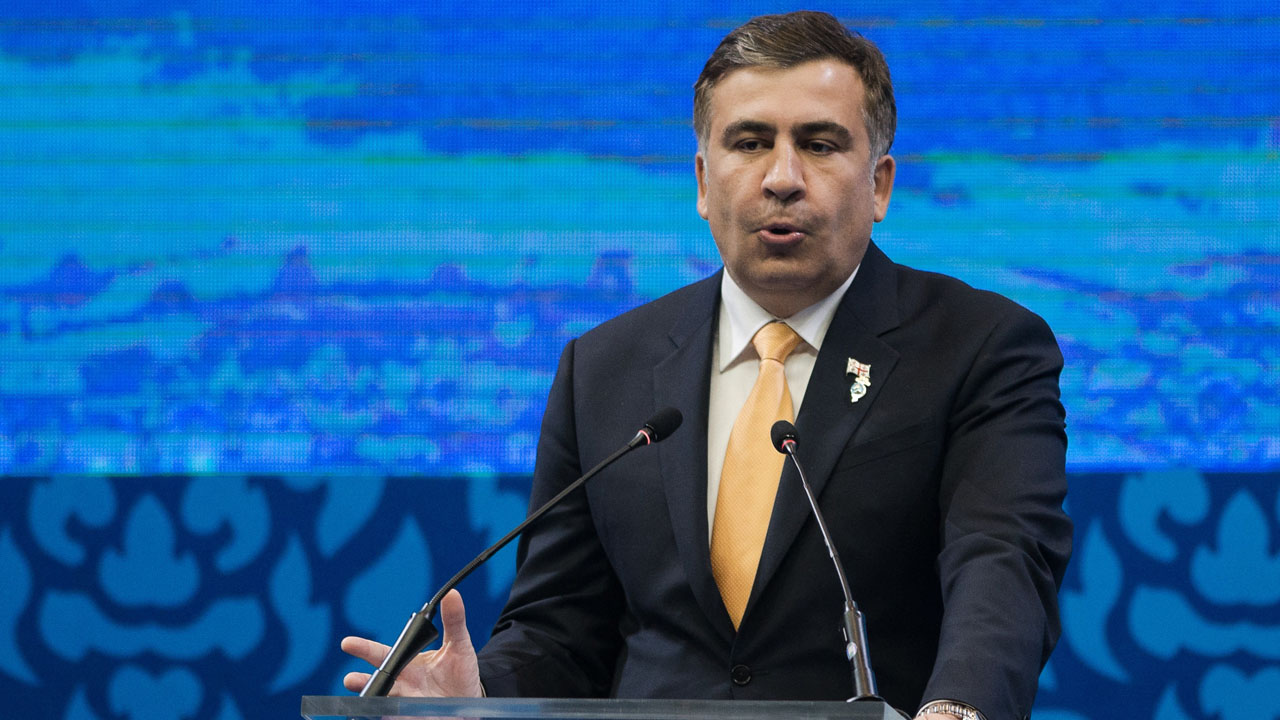
Saakashvili, 54, refused to eat for 50 days and then for 20 days to protest against his imprisonment following a conviction for abuse of power, which he denounces as political. (Photo by Nicolas ASFOURI / AFP)
Georgia’s jailed former president Mikheil Saakashvili whose health was weakened by a prolonged hunger strike risks death in the absence of adequate care, doctors said on Friday.
Last year the 54-year-old refused food for 50 days to protest his imprisonment for abuse of office, a conviction he has denounced as politically motivated.
His doctors and lawyers have said he was physically and psychologically abused in prison.
Amnesty International has branded Saakashvili’s treatment by the Georgian government “not just selective justice but apparent political revenge”.
On Friday, a group of independent doctors who had examined Saakashvili in custody, said he had developed a litany of illnesses, was denied adequate medical treatment and periodically “subjected to psychological and physical pressure”.
They said Saakashvili was diagnosed with Wernicke’s encephalopathy — an acute neurological condition — anorexia, post-traumatic stress disorder, brain damage and acute gastritis, among other conditions.
They said their patient needed to be urgently transferred to a modern clinic for rehabilitation “in an environment free from stress-inducing factors”.
Otherwise, Saakashvili risks developing a neurological disorder that could lead to dementia, multiple organ failure, and “a fatal outcome”.
“Clearly, Saakashvili cannot be cured in custody, he must urgently receive adequate medical treatment outside prison — to avoid fatal outcome,” one of the doctors, Mariam Jishkariani, told AFP.
A separate group of medics, set up by Georgia’s Public Defender Nino Lomjaria, has also said Saakashvili’s treatment “under current conditions will only aggravate his condition and may lead to a fatal outcome.”
‘Continued torture’
Lomjaria said Saakashvili’s condition “has deteriorated significantly and a timely provision of qualified medical care is crucial”.
His lawyer Nika Gvaramia warned last month that failure to provide adequate medical service is “a form of continued torture under international law,”
The US embassy in Tbilisi said on Thursday it was following Saakashvili’s condition “very closely”.
“We urge the government to take the Public Defender’s recommendations very seriously,” ambassador Kelly Degnan told journalists.
Saakashvili’s United National Movement party — Georgia’s main opposition force — said in a statement, “Several EU countries have expressed their willingness to ensure Saakashvili’s transfer abroad and take all necessary measures to ensure his recovery”.
Georgian authorities have ridiculed doctors’ concerns.
The ruling Georgian Dream party chairman, Irakli Kobakhidze, told reporters this week that “Saakashvili is upset that his quality of life worsened after he was jailed.
“He must eat eggs and cottage cheese and everything will be okay,” he added.
The pro-Western opposition leader, who headed the small Caucasus nation of some four million people from 2004 to 2013, was jailed in October, days after secretly returning from exile in Ukraine.
He was active in Ukrainian politics after moving there when his second and last term as president ended in 2013.
In 2020, Ukrainian President Volodymyr Zelensky appointed Saakashvili as his senior adviser on reforms.
He had earlier served as governor of Ukraine’s strategic Odessa region, where he focused on efforts to fight corruption.
His presidency saw Russia’s invasion of Georgia in August 2008, a war that marked a culmination of tensions with Moscow over Tbilisi’s pro-Western orientation.
Saakashvili’s arrest spurred the largest anti-government protests in a decade and deepened a political crisis stemming from 2020 parliamentary polls that the opposition denounced as fraudulent.
Prime Minister Irakli Garibashvili sparked an uproar when he said the government had been forced to arrest Saakashvili because he refused to quit politics.



